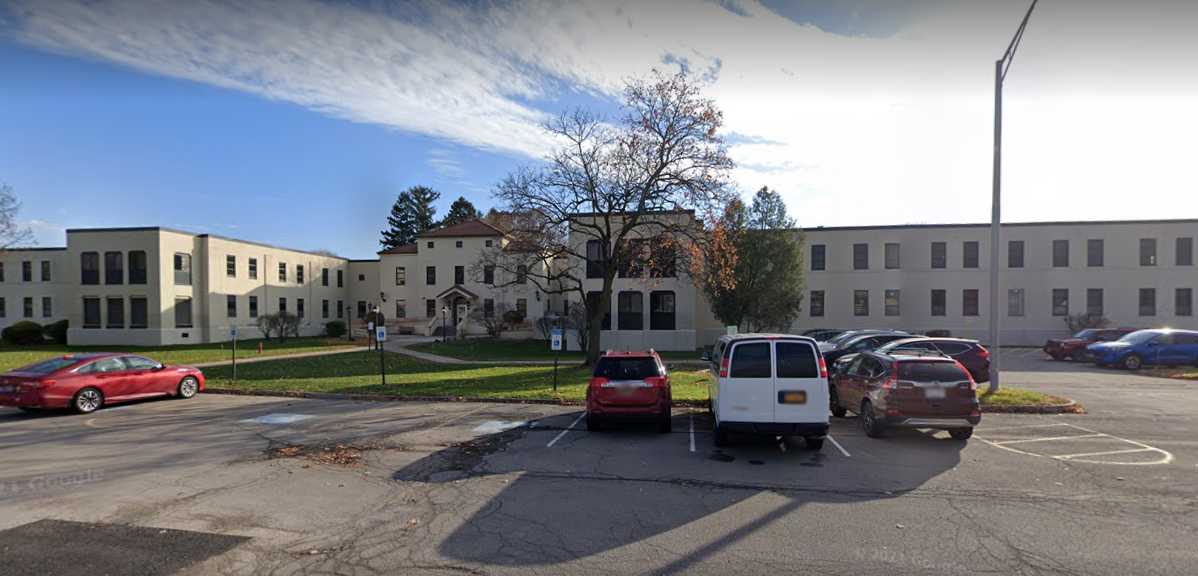Catholic Family Center

Contact Details
-
Name:Catholic Family Center
-
Address:24 Jones Avenue
Rochester, NY - 14608 -
Phone:585-719-8523
-
Email:
-
Website:
Description
There are currently state and federally funded or sponsored drug and alcohol treatment centers in the state of New York
Questions & Answers
Help others like you find out more about Catholic Family Center. Do you know the answers to any of these questions? Contribute now and help others like you.
What kinds of care do they offer?
-
Substance use treatment
Refers to a broad range of activities or services, including identification of the problem (and engaging the individual in treatment); brief interventions; assessment of substance abuse and related problems including histories of various types of abuse; diagnosis of the problem(s); and treatment planning, including counseling, medical services, psychiatric services, psychological services, social services and follow-up for persons with alcohol or other drug problems (Institute of Medicine, 1990).
-
Transitional housing, halfway house, or sober home
Housing for individuals recovering from substance abuse that is designed to provide a drug and alcohol-free living environment and appropriate support services to facilitate movement to independent living. Such housing includes transitional living, sober houses, sober living, recovery houses, and 3/4 houses.
What types of opioid treatment do they provide?
-
Buprenorphine maintenance
-
Relapse prevention with naltrexone
Program or group specifically tailored for relapse prevention from Naltrexone which helps people retrain their minds and behaviors to avoid alcohol as a solution to emotional or psychological triggers.
-
Use methadone/buprenorphine for pain management or emergency dosing
-
Accepts clients using MAT but prescribed elsewhere
-
Prescribes buprenorphine
-
Prescribes naltrexone
What opioid medications are used in treatment?
-
Buprenorphine used in Treatment
Buprenorphine is used in medication-assisted treatment (MAT) to help people reduce or quit their use of heroin or other opiates.
-
Naltrexone used in Treatment
What specific pharmacotherapy treatments do they provide?
-
Naltrexone (oral)
-
Naltrexone (extended-release, injectable)
-
Nicotine replacement
Administers nicotine to the body by means other than tobacco, without other harmful chemicals found in tobacco. Common forms of nicotine replacement therapy are nicotine patches, nicotine gum or lozenges, nasal spray and inhaler. The goal of nicotine replacement is to prevent cravings in a tobacco user, allowing the person to abstain from tobacco.
-
Non-nicotine smoking/tobacco cessation
Are medications that do not contain nicotine but act on the brain to reduce a person's craving for tobacco. Some common medications are Bupropion (Zyban, Wellbutrin), and Nortriptyline (Pamelor). Medications are often prescribed in conjunction with behavioral counseling or support groups to provide the best chance for achieving long-term smoking abstinence. (http://www.mayoclinic.com)
-
Acamprosate (Campral?)
Acamprosate is used in combination with psychological and social treatments as part of a full alcoholism treatment plan. It is recommended for people who are motivated to reach alcohol abstinence rather than to simply decrease drinking amounts.The mechanism of action is not exactly understood but it seems to help reduce cravings by reducing the positive response to drinking and reducing cravings. It is important to note that Campral does not help relieve the symptoms of alcohol withdrawal.
-
Disulfiram
-
Buprenorphine with naloxone
A prescription medication that combines buprenorphine (which helps relieve symptoms of opiate withdrawal) and naloxone (reverse the effects of narcotics) used to treat opioid addiction.
-
Buprenorphine without naloxone
An opioid used to treat opioid addiction by relieving the symptoms of withdrawal. It can be used under the tongue, by injection, as a skin patch, or as an implant.
-
Medications for HIV treatment
-
Medications for Hepatitis C treatment
-
Clonidine
-
Medication for mental disorders
-
Medications for pre-exposure to prophylaxis
What types of treatment approaches do they offer?
-
Telemedicine/telehealth therapy
The ability for healthcare providers, working from a distance using telecommunications technology, to communicate with patients, diagnose conditions, provide treatment, and discuss healthcare issues with other providers to ensure quality healthcare services are provided. Other names used for this treatment approach are: e-medicine, e-therapy, e-psychiatry, and telepsychiatry.
-
Substance use disorder counseling
A short-term treatment that has been generalized for a variety of disorders including opiate drug dependence and cocaine abuse. The therapy includes supportive techniques which encourage the patient to discuss personal experiences, and expressive techniques, which enable the patient to work through interpersonal relationship issues and gain greater self-understanding.
-
Trauma-related counseling
Cognitive behavior techniques adapted for clients suffering from post-traumatic stress disorder (PTSD) and other effects of abuse and trauma.
-
Motivational interviewing
A counseling approach which acknowledges that many people experience ambivalence when deciding to make changes. Its aim is not to focus immediately on the action of changing, but to work to enhance motivation to change.
-
Anger management
Uses strategies to address the anger cycle, conflict resolution, assertiveness skills, and anger-control plans. The goal of anger management is to reduce both emotional feelings and the physiological arousal that anger causes.
-
Relapse prevention
A cognitive behavioral therapy developed for the treatment of problem drinking and adapted later for cocaine addicts. Cognitive behavioral strategies are based on the theory that learning processes play a critical role in the development of maladaptive behavioral patterns. Individuals learn to identify and correct problematic behaviors. Relapse prevention encompasses several cognitive behavioral strategies that facilitate abstinence as well as provide help for people who experience relapse.
-
Smoking not permitted
Smoking is not allowed.
What type of setting is this location?
-
Residential/24-hour residential
-
Short-term residential
-
Long-term residential
Who is responsible for the operation of this facility?
-
State government
Government of a country subdivision in a federal form of government, which shares political power with the federal or national government and must meet certain standards set by the federal government, but are free to expand beyond what exists at the federal level and improve services, access, and protections for consumers, such as mental health and substance abuse services, in that state.
What types of license or certifications or accreditation does this facility posses?
-
State Substance use treatment agency
Government organization responsible for planning, organizing, delivering, and monitoring substance use disorder services in their respective state.
What types of payment or funding do they accept?
-
Cash or self-payment
Payment for treatment is made by the person directly, through cash or other means, rather than using health insurance.
-
Medicaid
A joint federal and state program that helps with medical costs for some people with low incomes and limited resources. Medicaid programs vary from state to state.
-
Medicare
The federal health insurance program for people age 65 and older and people with disabilities.
-
Private health insurance
Is any payment assistance available?
-
Sliding fee scale (fee is based on income and other factors)
Variable prices for services based on a person?s ability to pay.
What specific groups are treated here?
-
Clients with co-occurring mental and substance use disorders
Facility has a program or group specifically tailored for persons with co-occurring mental and substance abuse disorders.
-
Lesbian, gay, bisexual, transgender, or queer/questioning (LGBTQ)
Facility has a program or group specifically tailored for LGBT clients.
-
Criminal justice (other than DUI/DWI)/Forensic clients
Facility has a program or group specifically tailored for clients referred from the court/judicial system.
-
Adult men
Facility has a program or group specifically tailored for adult men.
-
Clients with HIV or AIDS
Facility has a program or group specifically tailored for persons with HIV or AIDS.
-
Clients who have experienced trauma
Facility has a program or group specifically tailored for persons who have experienced trauma.
-
Clients who have experienced sexual abuse
Facility has a program or group specifically tailored for persons who have experienced sexual abuse.
-
Clients who have experienced intimate partner violence, domestic violence
Facility has a program or group specifically tailored for persons who have experienced intimate partner violence, domestic violence.
-
Young adults
Facility has a program or group specifically tailored for Transitional age young adults.
-
Clients with co-occurring pain and substance use disorders
What ancillary services are offered at this facility?
-
Case management service
Helps people arrange for appropriate services and supports through a case manager who monitors the needs of clients/patients and their families and coordinates services, such as mental health, social work, health, educational, vocational, recreational, transportation, advocacy, and respite care, as needed.
-
Suicide prevention services
Include identifying risk factors; educating staff on identifying the signs of suicidal behavior and using methods to detect risk; and the assessment, intervention, and management of suicidal patients including treatment of an underlying mental or substance use disorder, and use of psychotropic medication, supportive services, and education. Hotlines help individuals to contact the nearest suicide prevention mental health provider.
-
Social skills development
-
Transportation assistance
What types of recovery support services are offered here?
-
Housing services
Are designed to assist individuals with finding and maintaining appropriate housing arrangements.
-
Employment counseling or training
Advises, coaches, provides information to and supports people who are planning, seeking and managing their life/work direction.
What types of screening and assessment methods are used here?
-
Screening for tobacco use
Determines a client's use of tobacco products, such as cigarettes, cigars, pipe tobacco, or smokeless tobacco. It is generally recommended that providers screen for tobacco use on a regular basis by asking clients, as they are seen, about their current and past use of tobacco products and their exposure to secondhand smoke or tobacco.
-
Comprehensive substance use assessment
-
Outreach to persons in the community
-
Screening for mental disorders
Test to determine whether a person is experiencing symptoms of mental health conditions and needs treatment.
-
Screening for substance use
Test to determine whether a person is experiencing symptoms of substance use and needs treatment.
What kinds of education and counseling services are offered here?
-
Smoking/vaping/tobacco cessation counseling
Includes interventions for persons who use tobacco and want help with stopping, including behavioral support or counseling in groups or individually.
-
Individual counseling
Process through which clients work one-on-one with a trained mental health clinician in a safe, caring, and confidential environment.
-
Group counseling
Form of therapy where people with similar experiences/issues come together with a professional therapist.
-
Family counseling
A type of psychological counseling (psychotherapy) that can help family members improve communication and resolve conflicts.
-
Marital/couples counseling
-
Substance use disorder education
-
Vocational training or educational support (for example, high school coursework, GED preparation, etc.)?
What age groups are accepted here?
-
Young Adults
Facility accepts young adults (13-25) for treatment.
-
Adults
Facility accepts adults (26-64) for treatment.
What genders are accepted here?
-
Male
What kinds of transitional services do they provide if any?
-
Aftercare/continuing care
-
Discharge Planning
A process that aims to improve the coordination of services after discharge from the hospital by considering the patient?s needs in the community.
-
Naloxone and overdose education
What types of testing do they offer?
-
Breathalyzer or blood alcohol testing
A device for estimating blood alcohol content (BAC) from a breath sample.
-
Drug or alcohol urine screening
Analyzes your urine for the presence of certain illegal drugs and prescription medications.
-
TB screening
Skin tests that are used to screen people who are at high risk for TB exposure such as people with diseases or conditions that weaken their immune system.
Who provides the opioid medications used in treatment?
-
No formal relationship with prescribing entity
What types of alcohol abuse treatment are available at this facility?
-
Accepts clients using medication assisted treatment for alcohol use disorder but prescribed elsewhere
Who provides the medication used in alcohol abuse treatment?
-
In-network prescribing entity
-
No formal relationship with prescribing entity
Is vaping allowed at this facility?
-
Vaping not permitted
How do I apply for admission at this location?
Have you been to this facility? What was your experience?
Is there a wait-list for treatment center?
Is any payment required?
Related Posts
John L Norris
- Rochester, NY
- 3.24 miles away
Canandiagua VAMC
- Rochester, NY
- 6.82 miles away


